Blockchain
Coinbase-Backed DeSo Unveils MegaSwap, a “Stripe for Crypto” product, with Over $5 Million in Volume – Blockchain News, Opinion, TV and Jobs
Published
1 year agoon
By
admin
DeSo is excited to announce the launch of MegaSwap – a revolutionary, cross-chain smart service that enables users to securely and easily swap coins between different blockchains with a frictionless zero-login. MegaSwap solves various critical pain points, including onboarding new users and liquidity to any web3 application across any blockchain ecosystem.
In its limited release, the platform has already seen more than $5 million in volume, demonstrating its potential to revolutionize the crypto market with cross-chain swaps.
MegaSwap offers an alternative and safer solution to the traditional centralized exchange model where users don’t ever have to log in or provide sensitive personal information. Instead of storing their coins on a centralized exchange, users can store them in their own self-custody wallets to mitigate the risk of unforeseen meltdowns, such as those seen with FTX, BlockFi, Celsius, or Voyager.
MegaSwap is a simple, innovative solution for developers seeking to build web3 applications on different blockchains. Developers can install its frictionless zero-login API with a single line of code, making their apps chain-agnostic and accessible from any blockchain. For the first time, apps on Ethereum can easily compose with apps on Solana or DeSo. MegaSwap thus makes it easier for liquidity and new users to be onboarded into any blockchain ecosystem.
“One of the biggest use cases we think will have the greatest impact is onboarding new users that don’t own your coin. That all changes with MegaSwap, where devs can leverage crypto-to-crypto swaps between any two coins no matter what blockchain ecosystem they’re in. This last use case is a great wedge because it solves the biggest pain point for every blockchain dev today: getting new users without making them buy your coin on an exchange.” – Founder of DeSo, Nader Al-Naji, explains.
The blockchain ecosystem is currently fragmented, making it hard for users who want to try out different web3 apps. With MegaSwap, users can easily and securely swap between Ethereum, Solana, Bitcoin, DeSo, and USDC, with support coming soon for other blockchains like NEAR, ADA, Doge, and more! This makes it easier than ever to move funds between blockchains allowing communities to seamlessly navigate from app to app.
DeSo is committed to creating a Social Layer for Web3 that allows communities to seamlessly transition between different blockchains. The launch of MegaSwap is a testament to this commitment and eliminates a major hurdle preventing the mass adoption of cryptocurrencies.
This is yet another example in a recent string of successes for DeSo. Recently, they launched a breakthrough fundraising platform called Openfund that enables entrepreneurs to launch tradeable coin-backed fundraising rounds via the world’s fastest order book exchange.
With the combination of Openfund and MegaSwap, founders and builders can easily fund projects, acquire new users, and expand their reach with a comprehensive suite of powerful tools in the DeSo ecosystem.
They also recently partnered with Princeton University to launch the first-of-its-kind web3 startup competition and have a slew of upcoming releases that will position DeSo as the go-to layer-1 blockchain to build decentralized social media applications.
Additionally, the Social Network Hard Fork just went live, enabling decentralized verifications. They plan to move to a proof of stake later this year, improving performance and energy efficiency.
DeSo is a new layer-1 blockchain built from the ground up to decentralize social media and scale storage-heavy applications to billions of users. It raised $200 million and is backed by Sequoia, Andreessen Horowitz, Coinbase Ventures, Social Capital, Polychain Capital, Winklevoss Capital, Pantera, and other blue chip funds.
Check out the full roadmap and claim your username on deso.com.
Source link
You may like
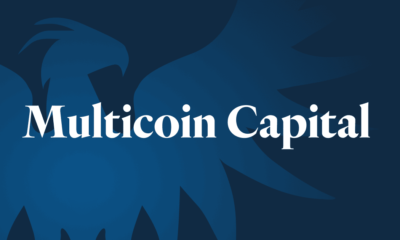

Multicoin Capital To Fund Crypto-Friendly US Candidates In Solana


Multicoin to Match Up to $1 Million in Solana Donations to Pro-Crypto Candidates


Multicoin Capital pledges up to $1m to pro-crypto Senate candidates
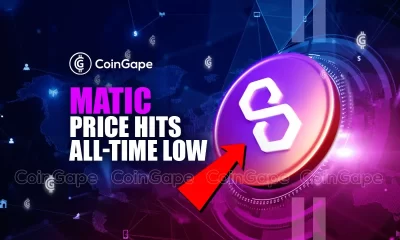

MATIC Price Crash: Reaching A Two Year Low


Multicoin Pledges up to $1M for Pro-Crypto Senate Candidates


Crypto heists near $1.4b in first half of 2024: TRM Labs
Blockchain
Nigeria to focus on Blockchain and emerging tech with plans to deploy research centers
Published
1 day agoon
July 4, 2024By
admin

The National Information Technology Development Agency (NITDA) in Nigeria is looking to deploy research centers geared towards emerging technologies like Blockchain.
The initiative was announced by the NITDA’s Director-General, Kashifu Inuw, at the IoT West Africa Conference in Lagos.
According to the director general, the research centers will focus on key technologies like artificial intelligence (AI), the Internet of Things (IoT), unmanned aerial vehicles (UAV), additive manufacturing, and robotics alongside blockchain tech.
The entities would be deployed across “six geo-political zones of Nigeria,” as per Inuwa.
Besides establishing these research units, the government would also aid Nigerian startups in scaling product development using these technologies. In this regard, innovation sandboxes would be leveraged to develop use cases and ultimately introduce these products to the market.
Amidst this backdrop, the NITDA has been training the nation’s populace via its 3 Million Technical Talent (3MTT) program. By 2027, the government plans to equip three million Nigerians with the necessary skills to bolster its current initiatives.
As a broader implication, Inuwa expects a boost in foreign exchange remittances as individuals trained via these initiatives leave the country.
Shitij Taneja, managing director of Vertex Next, the organizers of the IoT West Africa conference, called Nigeria “Africa’s next Silicon Valley.” He believes that Nigeria’s large youth population and its dynamic startup ecosystem position it as a leading force.
“The reason we are hosting the IoT West Africa, which is co-located with Africa data center and cloud Expo Africa is because we see a lot of potential in the market and the growing number of youths that are working towards the development of technology.”
Taneja added that the conference also seeks to draw investors towards Nigerian startups.
Nigeria’s growing focus on emerging technologies has been quite evident over the past months. In May, the NITDA restructured the National Blockchain Policy Steering Committee (NBPSC) in a move to facilitate better implementation of its National Blockchain Policy.
The nation is also eyeing potential collaboration with the United States of America to explore the potential of AI and other emerging technologies. This is despite the nation’s recent legal tensions with the economic powerhouse involving a detained executive of crypto exchange Binance.
Per the Blockchain Industry Coordinating Committee of Nigeria (BICCoN), a blockchain advocacy group, this development could lead to fragmented relations with global partners.
Source link
Blockchain
Flare integrates LayerZero V2, connecting to 75 blockchains
Published
2 days agoon
July 3, 2024By
admin

The cross-chain messaging platform LayerZero has integrated Flare, connecting the Layer 1 blockchain for data to 75 blockchain networks.
As announced on Wednesday, the integration means Flare can now connect to major blockchain networks such as Ethereum and Solana. The milestone also makes Flare accessible to multiple Ethereum Layer 2 (L2) networks, bringing over 50,000 decentralized applications (dApps) to Flare.
“This is an incredibly valuable integration for all users and builders on Flare. Deployment of LayerZero V2 will help accelerate Flare’s expansion, paving the way for builders to develop a wide variety of innovative interoperable products,” Flare co-founder Hugo Philion said.
Flare to benefit from LayerZero V2 integration
While the integration will also help any chain connect and leverage Flare’s decentralized data, there are numerous benefits to Flare.
Apart from Flare becoming a DVN on LayerZero V2, the integration also brings benefits such as secure connectivity to dApps, access to new users, and liquidity. Flare will also benefit from greater decentralization.
“Of great interest to me is the ability of LayerZero to help Flare facilitate a cross-chain money market, leveraging in addition, the integration on Flare of non smart contract tokens, such as BTC and XRP,” the Flare co-founder noted. “Other interesting angles are the ability of Flare builders to create omnichain fungible tokens or chain-agnostic NFTs. The opportunity for Flare to serve as a highly secure DVN on LayerZero V2 is of particular interest.”
LayerZero’s growing traction in crypto
Protocols leverage a key feature of LayerZero V2 – the modular security stack that allows protocols to confirm and validate cross-chain messages.
The technology behind this infrastructure is Decentralized Verifier Networks (DVNs), and networks can create their own DVNs to bolster security. Applications can also tap into LayerZero’s Omnichain Fungible Token standard to drive DeFi growth.
LayerZero’s cross-chain messaging protocol has facilitated more than 134 million cross-chain messages and helped secure the bridging of over $50 billion in crypto.
For instance, LayerZero-based bridge protocol Stargate Finance recorded nearly $800 million worth of bridged assets in June alone.
Source link
Blockchain
Blockchain can combat illicit fund transfers, Nigeria’s top finance investigator says
Published
6 days agoon
June 29, 2024By
admin

Blockchain technology and artificial intelligence (AI) can be used to combat illicit activity, according to Nigeria’s Economic and Financial Crimes Commission (EFCC) chair, Olanipekun Olukoyede.
The stakes are high for Africa. The continent loses a substantial $88.6 billion annually to illegal fund flows.
According to The Guardian, Olukoyede expressed concern that these funds could be better utilized for essential infrastructure, healthcare, and education.
A statement from the Commission’s spokesperson, Dele Oyewale, indicated that Olukoyede made this revelation in Tunis, Tunisia, during a keynote address at the Pan-African Conference on Illicit Financial Flows and Tax evasion.
The conference brought together key stakeholders to explore innovative strategies for asset recovery and financial reintegration in Africa.
Olukoyede also highlighted the difficulties encountered in asset recovery, including technical, legal, and political challenges that complicate the tracing, freezing, and repatriating of illicit funds.
He called for the enhancement of legal and institutional frameworks across African nations to combat IFFs more effectively.
Earlier in May, Olukoyede disclosed that terrorists are increasingly utilizing cryptocurrency traders to fund their activities in the country. According to Olukoyede, some young cryptocurrency traders are unknowingly being exploited by terrorist financiers to move funds, complicating efforts to track and halt these financial flows.
In a concerted effort to combat these illicit activities, the EFCC has blocked 1,146 bank accounts implicated in unauthorized dealings in foreign exchange, money laundering, and terrorism financing in Nigeria.
A significant number of these accounts were found to be connected to peer-to-peer cryptocurrency trading platforms, underscoring the growing intersection between digital currencies and illegal financial operations.
Olukoyede further highlighted the EFCC’s success in recovering $20 million worth of cryptocurrency from fraudsters.
In a notable move to hold cryptocurrency platforms accountable, the EFCC filed criminal charges against Binance, a leading cryptocurrency exchange, and one of its executives, accusing them of money laundering and tax evasion.
The EFCC chairman emphasized the importance of capacity building, robust legal systems, and improved coordination and cooperation at national, regional, and international levels.
He has advocated for using advanced technologies such as data analytics, blockchain, and AI to enhance asset tracking and recovery efforts.
He noted that these emerging technologies could be crucial in combating financial crimes enabled by cryptocurrencies, suggesting a future where advanced tech solutions bolster traditional enforcement measures.
Crypto and money laundering
Cryptocurrency has emerged as a significant facilitator of global money laundering activities, particularly in East and Southeast Asia.
According to the United Nations Office on Drugs and Crime (UNODC) report, cryptocurrencies, coupled with the rise of illegal online casinos and junkets, have contributed to the proliferation of underground banking and money laundering across East and Southeast Asia.
Organized crime groups have exploited vulnerabilities within the cryptocurrency ecosystem and online gambling platforms, using cryptocurrency exchanges and wallets to integrate billions of dollars in illicit proceeds into the financial system. This often involves mixing funds and conducting transactions anonymously.
In Nigeria, the cryptocurrency exchange giant Binance has been embroiled in allegations of $35.4 million in money laundering and tax evasion. CEO Richard Teng claimed to have been blackmailed by unidentified individuals in Nigeria demanding a $150 million cryptocurrency bribe, which the Nigerian government dismissed as baseless and an attempt to divert attention from ongoing investigations into Binance’s operations.
Recognizing the substantial money laundering risks posed by the cryptocurrency sector, the United Kingdom’s Financial Conduct Authority (FCA) highlighted crypto firms, alongside retail banking, wholesale banking, and wealth management, as high-risk areas for exploitation between 2022 and 2023. In response, UK police have deployed crypto tactical advisors nationwide to seize digital assets associated with criminal activities.
On June 4, Weidong “Bill” Guan, the Chief Financial Officer of the Epoch Times, was charged in a $67 million money laundering scheme involving cryptocurrency.
According to the indictment, spanning from 2020 to May 2024, Guan and his “Make Money Online” team allegedly used fraudulently obtained unemployment benefits and stolen identities to acquire prepaid debit cards. These cards were then sold at a discounted rate for cryptocurrency on specific platforms.
The illicit funds were allegedly laundered through various channels, including bank accounts belonging to The Epoch Times, Guan’s personal accounts, and his cryptocurrency holdings.
When financial institutions flagged suspicious transactions, Guan purportedly misrepresented the origins of the funds, claiming they were from legitimate online donations.
Source link

Multicoin Capital To Fund Crypto-Friendly US Candidates In Solana

Multicoin to Match Up to $1 Million in Solana Donations to Pro-Crypto Candidates

Multicoin Capital pledges up to $1m to pro-crypto Senate candidates

MATIC Price Crash: Reaching A Two Year Low

Multicoin Pledges up to $1M for Pro-Crypto Senate Candidates

Crypto heists near $1.4b in first half of 2024: TRM Labs

FTX Founder Sam Bankman-Fried’s Family Accused Of $100M Illicit Political Donation

Bitcoin Price Falls as Mt Gox Starts Repayments

20% Price Drop Follows $87 Million Spending Outrage

More than 10 years since the collapse of Mt. Gox, users confirm reimbursements

Leading Telecom Company Taiwan Mobile Gets Crypto Exchange License

Here Are Price Targets for Bitcoin, Solana, and Render, According to Analyst Jason Pizzino

Bitcoin price plunges below $55k as Mt. Gox announces repayments

Jasmy Sheds 20% Amid Bitcoin Sell-Off

Are they a good thing?

Bitcoin Dropped Below 2017 All-Time-High but Could Sellers be Getting Exhausted? – Blockchain News, Opinion, TV and Jobs

What does the Coinbase Premium Gap Tell us about Investor Activity? – Blockchain News, Opinion, TV and Jobs
BNM DAO Token Airdrop

NFT Sector Keeps Developing – Number of Unique Ethereum NFT Traders Surged 276% in 2022 – Blockchain News, Opinion, TV and Jobs
A String of 200 ‘Sleeping Bitcoins’ From 2010 Worth $4.27 Million Moved on Friday
New Minting Services

Block News Media Live Stream

SEC’s Chairman Gensler Takes Aggressive Stance on Tokens – Blockchain News, Opinion, TV and Jobs

Friends or Enemies? – Blockchain News, Opinion, TV and Jobs

Enjoy frictionless crypto purchases with Apple Pay and Google Pay | by Jim | @blockchain | Jun, 2022

How Web3 can prevent Hollywood strikes

Block News Media Live Stream

Block News Media Live Stream

Block News Media Live Stream

XRP Explodes With 1,300% Surge In Trading Volume As crypto Exchanges Jump On Board
Trending
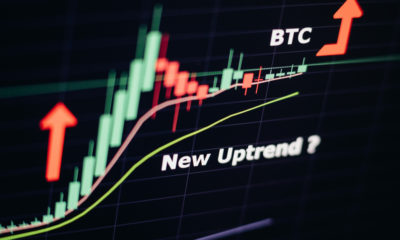
 Altcoins2 years ago
Altcoins2 years agoBitcoin Dropped Below 2017 All-Time-High but Could Sellers be Getting Exhausted? – Blockchain News, Opinion, TV and Jobs

 Binance2 years ago
Binance2 years agoWhat does the Coinbase Premium Gap Tell us about Investor Activity? – Blockchain News, Opinion, TV and Jobs
- Uncategorized3 years ago
BNM DAO Token Airdrop
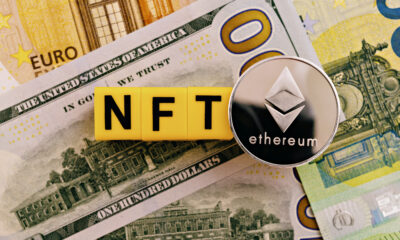
 BTC1 year ago
BTC1 year agoNFT Sector Keeps Developing – Number of Unique Ethereum NFT Traders Surged 276% in 2022 – Blockchain News, Opinion, TV and Jobs

 Bitcoin miners2 years ago
Bitcoin miners2 years agoA String of 200 ‘Sleeping Bitcoins’ From 2010 Worth $4.27 Million Moved on Friday
- Uncategorized3 years ago
New Minting Services

 Video2 years ago
Video2 years agoBlock News Media Live Stream
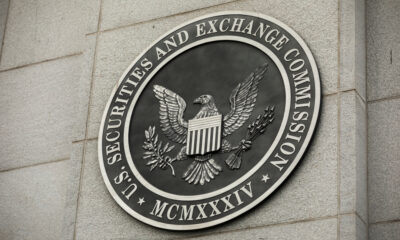
 Bitcoin1 year ago
Bitcoin1 year agoSEC’s Chairman Gensler Takes Aggressive Stance on Tokens – Blockchain News, Opinion, TV and Jobs


